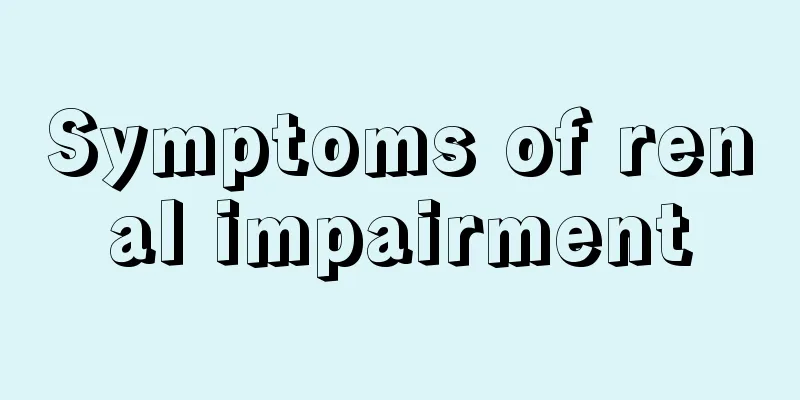Symptoms of renal impairment

|
Renal function damage means that the patient has renal insufficiency. Such patients often have problems with renal function, and some complications caused by renal function are also relatively harmful. First of all, renal function diseases mainly include acute and chronic glomerulonephritis, as well as renal tuberculosis, chemical poisons and biological toxins, etc., which require special attention to receive reasonable treatment methods. Whether renal insufficiency can be recovered and how to prevent it from worsening depends on every improvement of the patient during the treatment process. Simply answering the question of whether renal function failure can be recovered is bound to sound like nonsense. Here, I want to talk about several key points that determine whether renal insufficiency can be recovered: 1. Can renal insufficiency be restored? Key point 1 Causes of renal insufficiency: The causes of renal insufficiency can be summarized as follows: 1. Kidney diseases: such as acute and chronic glomerulonephritis, pyelonephritis, renal tuberculosis, acute tubular degeneration and necrosis caused by chemical and biological poisons, kidney tumors and congenital kidney diseases. 2. Extra-renal diseases: such as systemic blood circulation disorders (shock, heart failure, hypertension), systemic metabolic disorders (such as diabetes) and urinary tract diseases (urinary stones, tumor compression), etc. Generally speaking, when kidney disease is in the renal insufficiency stage, if the treatment measures are appropriate, renal insufficiency can be completely cured. However, if the renal insufficiency is caused by tumors and congenital kidney disease (such as polycystic kidney disease, renal cysts), any current medical treatment is helpless. The only way is to control the growth of the cyst and prevent it from recurring, so as to avoid the disease from worsening and affecting the survival of patients with renal insufficiency. 2. Can renal insufficiency be restored? The key point is to see the severity of renal insufficiency and whether effective treatment measures are taken: Clinically, renal insufficiency is divided into four stages: 1. Compensatory stage of renal insufficiency: creatinine index is between 120umol/L-133umol/L, and the number of renal units decreases by about 20~25%. At this time, the kidney's ability to excrete metabolic products and regulate water, electrolytes and acid-base balance is still good, and blood creatinine and blood urea nitrogen are normal or slightly elevated. 2. Decompensated renal insufficiency (azotemia stage): creatinine index is between 133umol/L-442umol/L, renal units are reduced by 50~70%, renal concentrating function is impaired, nocturia or polyuria, anemia, fatigue, loss of appetite, nausea and mild general discomfort occur. Azotemia and increased blood creatinine and urea nitrogen are common. 3. Renal failure stage: The creatinine index is between 442umol/L and 707umol/L, the renal units are reduced by about 70% to 90%, the renal function is severely damaged, and there are obvious anemia and gastrointestinal symptoms such as nausea, vomiting, and decreased appetite. Serum creatinine and urea nitrogen increased significantly, acidosis, water and sodium retention, low calcium, high phosphorus and high potassium. 4. Uremia stage: The creatinine index is greater than 707umol/L, and the number of renal units is reduced by more than 90%. This stage is the late stage of chronic renal failure, manifested by multiple organ failure throughout the body, such as nausea and vomiting, irritability, increased blood pressure, palpitations, chest tightness, inability to lie flat, difficulty breathing, severe anemia, convulsions, and coma in severe cases. There are often hyperkalemia, hyponatremia, hypocalcemia, and hyperphosphatemia. 3. Can renal insufficiency be recovered? The key point lies in the treatment of renal insufficiency. Renal insufficiency is a clinical syndrome that occurs in the late stages of various chronic renal diseases. Its main manifestations are persistent decline in renal function, retention of metabolites, disorders of water, electrolyte, acid and base balance, and complications of various systems. The disease is divided into four stages according to the degree of renal function damage: compensated stage, decompensated stage, renal failure stage, and uremia stage. Therefore, clinical improvement can be achieved through active treatment in the early stages. The increase in creatinine in chronic renal insufficiency is due to damage to the kidney's intrinsic cells. Renal fibrosis occurs, and normal renal units with filtration function are replaced by fibrous tissue, losing their detoxification function, causing toxins to accumulate in the body and cannot be excreted. |
<<: Symptoms of parasites in the stomach
>>: Symptoms of vitamin ad deficiency
Recommend
What are the causes of hiccups and ear pain
Pain in the ears caused by hiccups means that the...
What should I do if I vomit after eating something bad? Do these things well
Many people may eat something bad when they eat. ...
How to diagnose diseases from tongue coating
Abnormal tongue coating indicates that there is s...
Introduction to the healing time of tibial fracture
I believe some friends have had such an experienc...
10 foods that are often used on computers can help you detoxify. Kelp can keep your prostate healthy.
10 Common Computer Foods to Help You Detoxify Env...
The reason why I like to sleep crawling
Sleeping is an important stage for the human body...
What is the reason for gas in the stomach
Many times when we eat, if we eat some unhygienic...
Chuanwu mugwort honey drink can relieve cancer pain in patients with cervical cancer
After cervical cancer patients develop the diseas...
What is the best treatment for small cell lung cancer
Due to the incomplete understanding of small cell...
Why do my breasts feel itchy?
Breast itching is very common. It may be caused b...
Symptoms of prostate cancer in young people Three symptoms of prostate cancer in young people
Prostate cancer is one of the most common disease...
How is lactic acid produced in the human body?
I believe many people have had this experience, t...
Uses of talcum powder
The functionality of talcum powder is very powerf...
Can urinary tract infection be treated with intravenous drip?
Urinary tract health is a very important part of ...
Experts answer questions about the main causes of nasopharyngeal cancer
With the increasing incidence of cancer, more and...









